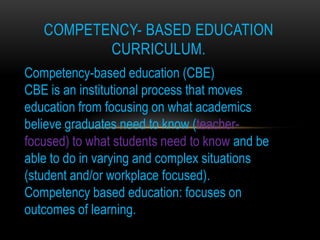
Vero power point presentation
- 1. COMPETENCY- BASED EDUCATION CURRICULUM. Competency-based education (CBE) CBE is an institutional process that moves education from focusing on what academics believe graduates need to know (teacher- focused) to what students need to know and be able to do in varying and complex situations (student and/or workplace focused). Competency based education: focuses on outcomes of learning.
- 2. CBE addresses what the learners are expected to do rather than on what they are expected to learn about. CBE emerged in the united states in the 1970s and refers to an educational movement that advocates defining educational goals in terms of precise measurable descriptions of knowledge, skills, and behaviors students should possess at the end of a course of study.
- 3. Competency Based Education is outcome based instruction and is adaptive to the changing needs of students, teachers, and the community. Competencies describe the student’s ability to apply basic and other skills in situations that are commonly encountered in everyday life. Thus CBE is based on a set of outcomes that are derived from an analysis of tasks typically required of students in life role situations.
- 4. Competencies consist of a description of the essential skills, knowledge, attitudes, and behaviors required for effective performance of a real-world task or activity. These activities may be related to any domain of life, though have typically been linked to the field of work and to social survival in a new environment. Competencies are essential skills that adults need to be successful members of families, the community, and the workplace. „
- 5. CBE is focused on outcomes (competencies) that are linked to workforce needs, as defined by employers and the profession. CBE’s outcomes are increasingly complex in nature, rather than deriving from the addition of multiple low-level objectives. CBE often necessitates more complex assessment, involving portfolios, experiential learning assessment in field experience, demonstration in varying contexts. Competencies reinforce one another from basic to advanced as learning progresses.
- 6. Competencies within different contexts may require different bundles of skills, knowledge and attitudes. The challenge is to determine which competencies can be bundled together to provide the optimal grouping for performing tasks. Another challenge is designing learning experiences that support students as they practice using and applying these competencies in different contexts. Continual refinement of defined competencies is necessary so that enhanced performance in a variety of contexts can be assessed. In essence, CBE is a process, not a product.
- 7. CBE is more than an effort to describe or list educational and behavioral objectives. The early emphasis on behavioral learning objectives was on reliable observation and judgment. To this end, writers of behavioral objectives were encouraged to state outcomes in operational terms, which can be observed using consistent observational processes allowing for no interpretation In an attempt to achieve this reliability, a behavioral verb from a list of behavioral verbs (state, list, name, recognize, describe, calculate, describe , explain, synthesize, analyze) was required to begin the objective.
- 8. Competency Based Education (CBE) Competency Based Education (CBE) Assses Participant Needs. Evaluate Competency Select Attainment Competencies Target instruction
- 9. COMPETENCY BASED EDUCATION PROGRAMS 1-Specific, measurable competency statements 2. Content based on learner goals (outcomes/competencies) 3. Learner continues in program until demonstrating mastery 4. Use a variety of instructional techniques and group activities 5. Focus on what the learner needs to learn, which is the application of basic skills in a life skills context 6. Use texts, media, and real life materials geared to targeted competencies 7. Provide learners with immediate feedback on assessment performance 8. Pace instruction to learner needs. 9. Have learner demonstrate mastery of specified competency Statements.
- 10. Competency-based education primer. Competency-based education is an outcomes-based approach to education where the emphasis is on what comes out of postsecondary education—what graduates know and can do—rather than what goes into the curriculum. With a competency-based approach, you do begin preparing a course syllabus by identifying content and readings. Instead, you begin by identifying competencies and then select the content, readings, and assignments to support student attainment of those competencies.
- 11. With a competency-based approach, students advance when they have demonstrated mastery of a competency, which is defined as “a combination of skills, abilities and knowledge needed to perform a task in a specific context.” Mastery is the sole determinant of progress, which means that delivery options multiply and expand since any instructional method or instructional provider that can move a student toward mastery is theoretically acceptable. In competency-based education, assessment is embedded in every step of the learning process in order to provide students with guidance and support toward mastery. This heightened level of assessment is designed to build competencies in real time.
- 13. Conclusion It is possible that competency-based education could serve as a game changer in postsecondary education, delivering high-quality education experiences that lead to demonstrated learning and mastery at an affordable price. Over the past decade we’ve learned much about established organizations but there remains a great deal to learn about the mix of technology, curriculum, and processes that could turn competency-based education into a true game changer in postsecondary education.
